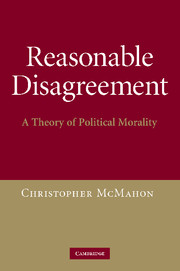5 - Localism
Published online by Cambridge University Press: 11 September 2009
Summary
According to moral nominalism, judgments of political morality employ socially available moral concepts to give a conceptually articulated structure to a motivational disposition that will be possessed by all properly functioning humans, the disposition to make and seek concessions in the context of a cooperative endeavor when others are similarly disposed. As I have formulated moral nominalism, the normativity of proper functioning is not construed nominalistically. It is given a realist interpretation. Whether human mental capacities are functioning properly is a matter of objective normative fact. Proper functioning is thus the same in all human communities. But the normative and evaluative concepts that are available to people making judgments of political morality will differ from polity to polity. Different kinds of claims will be acknowledged, and different ways of organizing political cooperation will be found acceptable by reasonable people.
These differences have a historical explanation. They are the result of the past operation of conceptual-cum-social processes of the sort described in the previous chapter. Although the world is increasingly interconnected, this was less true in the past. There were sharper local differences in the normative and evaluative concepts employed in thinking about how to organize political cooperation, and these differences have left traces in the sets of concepts available now in different polities. In addition, the histories of different polities have been marked by different exogenous changes in the social environment of the sort that can prompt conceptual transformation, for example, changes produced by infectious diseases or by conquest.
- Type
- Chapter
- Information
- Reasonable DisagreementA Theory of Political Morality, pp. 129 - 158Publisher: Cambridge University PressPrint publication year: 2009



